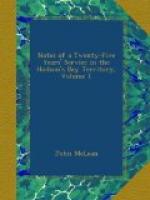On arriving at the post, I found the opposition party in active preparation for their departure, Macdonell having received orders from his father to that effect. He embarked as soon as the navigation became practicable. Opponent as he was, I experienced some painful sensations at parting with him; but soon had the consolation to see our opponent at the lower post occupy his place,—a measure which he ought to have adopted at a much earlier period, as even then it gave him a much better chance for a share of the spring trade than below, where he might be said to be placed between two fires. His removal, however, enabled us to concentrate our whole strength against him, so that he could not move a foot without a strong party at his heels. Thus circumstanced, he chose to await the arrival of the natives quietly at his post, and we were happy to follow his example.
The spring passed in a happy state of quiescence, which was scarcely disturbed by the arrival of the Indians, who, this year, had all taken a fancy to visit their ghostly fathers at the Lake,[1] and had, consequently, no time to spend with us; some intending to get married, some having children to be baptized, and some carrying their dead, in order that the last sacred rites for the benefit of their departed spirits might be performed upon them. A few tetes de boules remained for some time, but under so strict a surveillance that they could seldom communicate with our opponents without being observed, and the discovery subjected them to some chastisement.
[1] Of the Two Mountains.
I shall here relate a circumstance that occurred at this time, as an example of the cunning of the Indians in devising plans to evade us. Soon after their arrival, an old squaw brought to our house several casseaux[1] of sugar, and pointing out one, which she said was left open for immediate consumption, said she would return for it presently. She came next day and took the casseaux down to the tent of the Algonquin chief, who had passed the spring close by, and was now building a canoe, preparatory to his departure for the Lake. Soon after I went to have a chat with the chief, and found only his squaw at home. I observed the casseau, and asked for what purpose it was brought there. “Mine hostess” smiled, and answered, “You ought to know everything about it, when it has just quitted your house and passed the night with you. You whites pretend to be very cunning,” she continued, “but when an Indian, or even an old squaw tries to cheat you, your ‘white’ knowledge is no match for her. Now look into that casseau, Anamatik,[2] and see what is in it.”
[1] Packages made of bark.
[2] My Indian cognomen.
I looked, and found, instead of sugar, a very valuable bundle of furs.
“What do you think of the sugar?”
“Oh, it is very fine indeed; so much finer than any that I have, that I must take it along with me.”




